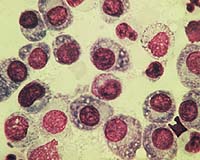 |
Washington DC (SPX) Oct 07, 2010 A new research study published in The FASEB Journal may change how sports injuries involving muscle tissue are treated, as well as how much patient monitoring is necessary when potent anti-inflammatory drugs are prescribed for a long time. That's because the study shows for the first time that inflammation actually helps to heal damaged muscle tissue, turning conventional wisdom on its head that inflammation must be largely controlled to encourage healing. These findings could lead to new therapies for acute muscle injuries caused by trauma, chemicals, infections, freeze damage, and exposure to medications which cause muscle damage as a side effect. In addition, these findings suggest that existing and future therapies used to combat inflammation should be closely examined to ensure that the benefits of inflammation are not eliminated. "We hope that our findings stimulate further research to dissect different roles played by tissue inflammation in clinical settings, so we can utilize the positive effects and control the negative effects of tissue inflammation," said Lan Zhou, M.D., Ph.D., a researcher involved in the work from the Neuroinflammation Research Center/Department of Neurosciences/Lerner Research Institute at the Cleveland Clinic in Ohio. Zhou and colleagues found that the presence of inflammatory cells (macrophages) in acute muscle injury produce a high level of a growth factor called insulin-like growth factor-1 (IGF-1) which significantly increases the rate of muscle regeneration. The research report shows that muscle inflammatory cells produce the highest levels of IGF-1, which improves muscle injury repair. To reach this conclusion, the researchers studied two groups of mice. The first group of mice was genetically altered so they could not mount inflammatory responses to acute injury. The second group of mice was normal. Each group experienced muscle injury induced by barium chloride. The muscle injury in the first group of mice did not heal, but in the second group, their bodies repaired the injury. Further analysis showed that macrophages within injured muscles in the second group of mice produced a high level of IGF-1, leading to significantly improved muscle repair. "For wounds to heal we need controlled inflammation, not too much, and not too little," said Gerald Weissmann, M.D., Editor-in-Chief of The FASEB Journal, "It's been known for a long time that excess anti-inflammatory medication, such as cortisone, slows wound healing. This study goes a long way to telling us why: insulin-like growth factor and other materials released by inflammatory cells helps wound to heal." Details: Haiyan Lu, Danping Huang, Noah Saederup, Israel F. Charo, Richard M. Ransohoff, and Lan Zhou. Macrophages recruited via CCR2 produce insulin-like growth factor-1 to repair acute skeletal muscle injury FASEB J. doi:10.1096/fj.10-171579
Share This Article With Planet Earth
Related Links Federation of American Societies for Experimental Biology Hospital and Medical News at InternDaily.com
 Radiation Pharmacogenomics Personalize Cancer Treatment
Radiation Pharmacogenomics Personalize Cancer TreatmentCold Spring NY (SPX) Oct 06, 2010 Radiation therapy is used to treat more than half of all cancer cases, but patient response to therapy can vary greatly. Genetics is increasingly being recognized as a significant contributor to inter-individual response to radiation, but the biology underlying response remains poorly understood. In a study published online in Genome Research, researchers employed a pharmacogenomics approa ... read more |
|
| The content herein, unless otherwise known to be public domain, are Copyright 1995-2010 - SpaceDaily. AFP and UPI Wire Stories are copyright Agence France-Presse and United Press International. ESA Portal Reports are copyright European Space Agency. All NASA sourced material is public domain. Additional copyrights may apply in whole or part to other bona fide parties. Advertising does not imply endorsement,agreement or approval of any opinions, statements or information provided by SpaceDaily on any Web page published or hosted by SpaceDaily. Privacy Statement |